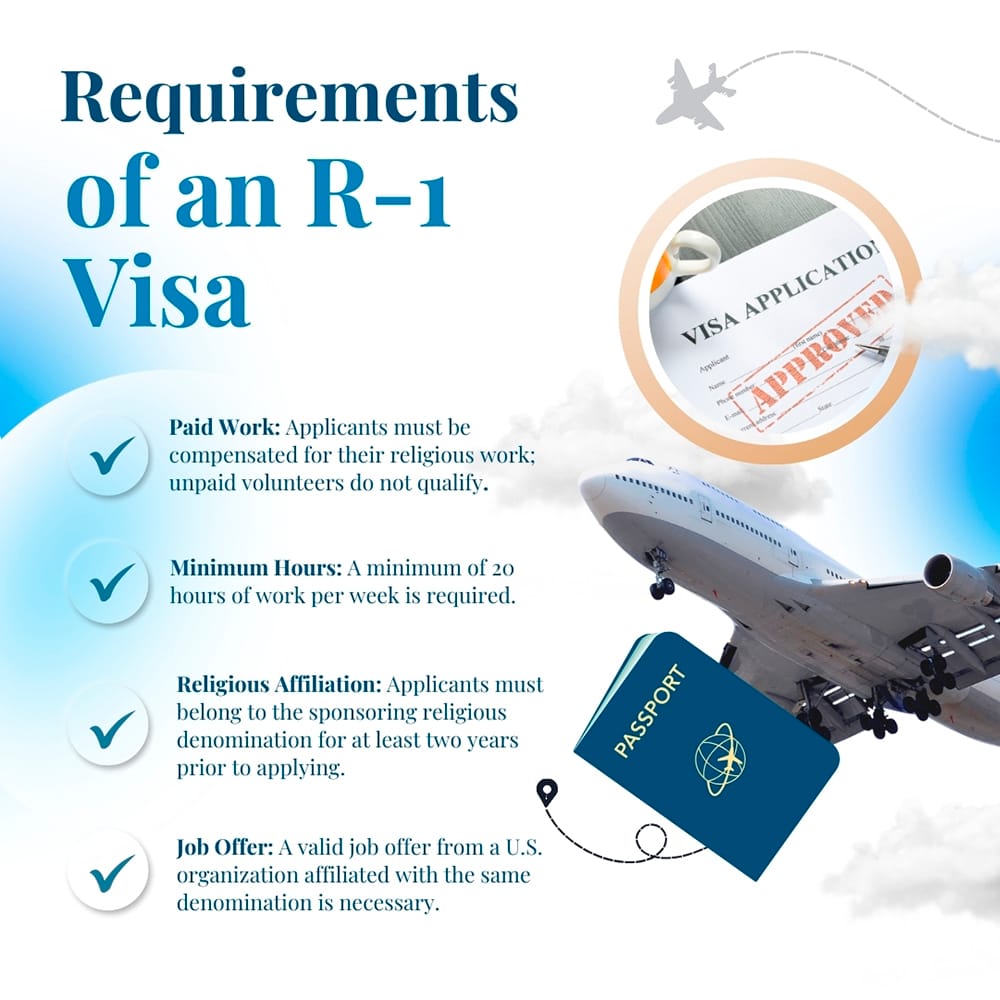- (973) 626-1177 Open 24/7
Table of contents
On the surface, it may appear that some U.S. visas are easy to obtain. But with constant immigration changes and so many layers of bureaucracy involved, the entire process can be daunting. An R-1 religious worker visa, for example, requires many eligibility hurdles to cross. With an experienced religious worker attorney who’s well-versed in immigration law, the process goes much smoother. In NYC, call Kats Immigration Law to speak to the best R-1 visa lawyer.
What Is an R-1 Visa?
 Non-immigrant religious workers who want to come to the United States on a temporary basis for the purpose of performing religious work may qualify for a Religious Worker Visa, also called an R-1 visa. An R-1 visa makes it possible for you to work in the U.S. at a qualifying non-profit church or religious organization on a temporary basis.
Non-immigrant religious workers who want to come to the United States on a temporary basis for the purpose of performing religious work may qualify for a Religious Worker Visa, also called an R-1 visa. An R-1 visa makes it possible for you to work in the U.S. at a qualifying non-profit church or religious organization on a temporary basis.
The required paperwork to apply for an R-1 visa or other types of visas can be daunting and confusing. Working with an experienced R-1 visa lawyer is the best way to make sure that an R-1 visa is the best option for you, and once that’s determined, to ensure that your application process goes smoothly. If you’re looking for an expert religious worker attorney, Alina Kats of Kats Immigration Law can answer your questions and guide you through the process.
What Are the Requirements of an R-1 Visa?
An R-1 religious worker visa may be issued to members of the clergy and those directly tied to religious work. Support staff and clerical personnel wouldn’t qualify for this type of visa and would have to discuss other options with an experienced religious worker lawyer. Requirements for an R-1 visa include:
- Paid work. To obtain this type of non-immigrant visa, your religious work must be paid. Unpaid volunteers don’t qualify.
- You must work a minimum of 20 hours a week.
- Religious denomination. You must belong to the denomination you plan to work for in the U.S. for a minimum of two years before filling out an application.
- Job offer. You must have a job offer in the U.S. to work for the same denomination you’ve been affiliated with.

The organization you plan to work for must be a non-profit religious organization or a religious organization with a group tax exemption. The nature of your job must be a role tied to the religious organization’s core spiritual functions.
Clients Experience
The best Immigration Attorney! Alina Kats is the best Immigration Attorney. She is very professional and knowledgeable. Her team is excellent as well. They did outstanding work for my husband. I highly recommend her to anyone who needs legal help.
Svetlana NevmirichenkoI had the pleasure of working with Attorney Kats in our representation of a mutual client. She was incredibly helpful, diligent, attentive, and communicative throughout the case. Our client obtained a great outcome due to her expertise. I would highly recommend her for any of your immigration needs.
Brian JordanI had the pleasure of working with Alina and her team, they are all so supportive, understanding and helpful. I felt important and understood, nowadays it is rare to find such law firms. I highly recommend Alina Kats and her law firm.
LelaHow Do I Apply for an R-1 Visa?
A potential employer in the U.S. files a petition to the United States Citizenship and Immigration Services (USCIS) on your behalf. This is done by completing form I-129, which is Petition for Nonimmigrant Worker. Documentation that must be provided by the petitioner include:
- Proof that the organization has tax-exempt status
- Documentation such as budgets and past records of how the religious worker will be compensated
- Job description and detailed information of how time will be spent on the job
- Evidence of being part of the religious denomination for at least two years
- Evidence that you’re qualified to perform the duties required by the position offered and documentation of the organization’s typical requirements for this position
- Literature that describes the religious nature of the organization
- Information about the physical address where the duties will be performed so that USCIS can perform an on-site inspection
The filing fee for Form I-129 must be paid — premium processing is an option for an additional fee. If the petition is approved by USCIS, you and the petitioner receive form I-797, Notice of Action. This allows you to apply for a non-immigrant visa on Form DS-160 through a consulate or U.S. Embassy. Processing the application may take several months.
If your application is approved, you’re authorized to work legally for the employer that filed the visa petition who’s known as the R sponsor. If you wish to change jobs, you need a new visa. An R-1 visa is typically good for 30 months and may be extended to a maximum of five years. At the end of five years, you must be physically outside the U.S. for one year before reapplying.
What Are the Benefits of an R-1 Religious Worker Visa?
An R-1 visa authorizes you to work for up to five years for a particular employer. Other benefits of an R-1 religious worker visa include:
- There’s no cap on the number of R-1 visas issued.
- Your spouse and unmarried children under the age of 21 may accompany you to the United States under an R-2 visa, but they can’t work while they’re here. If your spouse and children accompany you to the U.S., you’re required to provide documentation of their relationship to you such as a marriage certificate or birth certificate.
- You’re not required to have a degree to work as a religious worker.
It may be possible to transition to other visa categories, which may be non-immigrant or immigrant visas. You may qualify for a green card as a special immigrant, which allows you to live and work permanently the U.S.
What Can an R-1 Visa Lawyer Do?
The stakes are high for non-immigrants trying to obtain a visa. Errors made during the application process can cause delays or even denial. An experienced R-1 visa lawyer makes sure you understand the process of applying for a religious worker visa. They also help you take the correct steps in the application process and assist with gathering the proper documentation.
When you’re facing confusion or challenges related to immigration law in Brooklyn, the top R-1 visa attorney is Alina Kats. She provides comprehensive consultations to assess your eligibility and explore your immigration options. If you have any questions about citizenship and naturalization, other types of worker visas or any other aspect of immigration law, contact Kats Immigration Law today
